When last we left our heroes, they were screaming in shock at Tawaret, the hippo goddess! We rejoin them in Moon Knight’s fifth episode, “Asylum,” written by Rebecca Kirsch and Matthew Orton, and directed once again by the fantastic Mohamed Diab. I gotta warn you, things get heavy. I’ve tried to talk about all of it below but I’m guessing I missed some things—this episode is STUFFED.
Like, hippo plushie in a museum gift shop stuffed.
Spoilers ahead!
Recap
This episode shuffles like a deck of cards between the asylum in Chicago, where Harrow is trying to guide Marc, and later Steven, to an emotional breakthrough; the ship of Ra, where Marc’s and Steven’s hearts are being weighed together on the Scales of Judgement; and Marc’s memories, which he needs to share with Steven in order to get the scales to balance. About halfway through the episode we learn that Harrow has kickstarted Ammit’s judgement, as souls begin crashing into the sands of the underworld. We finally see the origin of both Steven and Moon Knight.
This episode is a lot, and let me put a general content warning here for a child’s death, and physical and emotional abuse.
We pick up with Marc, in a session with Dr. Harrow, who wants to hear more about this rhinocerous.
“Hippopotamus,” Marc corrects.
Dr. Harrow apologizes for the mix up, then explains that Marc is attempting to process his emotions using an organizing principle—in this case the idea that he’s a superhero in contact with Egyptian gods. He get violent, and one of the orderlies injects him with a ridiculously large syringe full of… something.
He’s back in the hallways with Steven and Tawaret. When Marc begins to buy into Harrow’s idea that this whole thing is a hallucination and and organizing principle, Tawaret counters with the alternative that they’re actually quite dead, and she needs to process their souls.
Marc is skeptical—this is THE afterlife? Tawaret explains that this is “one of many intersectional planes for untethered consciousness,” and that “a psych ward’s a first for me but we can roll with it, right?” It’s all okay, because she has cards for what they’re supposed to do next. She proceeds to flip through papyrus cards, until she finds the one with the speech about having your hearts weighed for judgement.
Marc rejects this idea, throws a pair of doors open expecting to find a therapy session. But no, they’re on a boat sailing over the sands of the souls of the dead. Tawaret takes their hearts out (they look like carved alabaster) and puts them on the scale, where, just as when Harrow tried this, they refuse to balance. Tawaret tells them to go back through Marc’s memories to try to open up to each other so their hearts will be prepared for death.
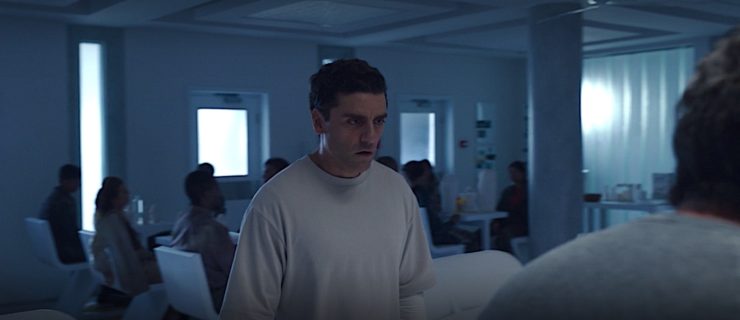
One of the memory rooms is full of the people Marc killed. (He says they were for Khonshu, but are some of the people he, um, mercenaried to death here, too?) Steven sees a child, demands to know why there’s a child in the room full of murdered people, and chases after the kid when he runs. Marc chases after Steven.
They run into a garden. There are Marc’s mother and father… and Marc’s little brother, Ro-Ro.
Oh… no.
Marc takes his brother Ro-Ro to play Tomb Busters in a cave. The cave floods, Ro-Ro drowns, Marc can’t save him. (This happens offscreen as Steven, watching the memory, screams at the boys and tries to guide them out.) Marc’s mother blames her older son for the death of the younger. She won’t let him sit shiva for his brother (which the other adults, including his dad, allow???) and begins to drink heavily.
Steven is increasingly furious at these memories, insisting that Marc must be lying, because his mother didn’t behave that way. We see a birthday that his mother refuses to attend, and then another one where she gets drunk and starts screaming at him again. He runs away to his room, but when Steven tries to follow, Marc stops him, and suddenly they’re in the memory of the night Marc became Moon Knight.
Marc explains that after he got discharged for going AWOL during a fugue state, he went to work for his old CO, Bushman, a job went wrong, and there’s Layla’s dad, dead in the sand. Marc is dragging himself into a nearby tomb, shot up and bloody. He puts his gun under his chin to end it. He hears a voice saying, “What a waste”—it’s Khonshu, offering to save his life in exchange for service.
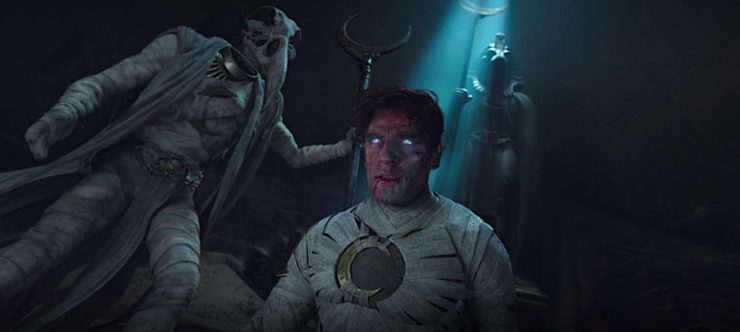
Steven, despite all the horrific stuff he’s seen, takes the time to tell Marc that he was being manipulated. That Khonshu was taking advantage of him. But obviously they can’t change the past, Marc says yes, and the suit is summoned for the first time.
The come back out onto the Ship of Ra, and see that souls are falling into the sand before their time. Seemingly, Harrow has unleashed Ammit. Tawaret makes a new plan to take them to Osiris’ gate, so they can go back through and try to stop Harrow. But before that, they need to finish balancing the scales.
Steven demands to see the room, and when Marc refuses, Steven tells him that if Layla dies back on Earth it’ll be his fault. Marc responds by slapping himself in the head and screaming “You can’t make me!”—and then he’s back in the asylum. Harrow assures him that he was not sedated, and that they’re making progress, but he needs him to open up to Steven. He gives him a glass of water, Marc looks into it, and they’re back in the bedroom.
Marc’s mother pounds on the door while Marc huddles on the floor saying “That’s not my mom” over and over again. Finally, his eyes roll back and he becomes Steven. Steven, obliviously, starts cleaning the room. Adult Steven watches this and realizes that he was named after Dr. Steven Grant from the movie Tomb Buster.
“You made me up?” Steven says, as their mom breaks the door down and reaches for a belt. Marc again drags Steven out, saying “You’re not meant to see that! That’s the whole point of you!” So, what happened in that room is that Marc’s mother would beat the crap out of him, and Marc created the persona of Steven as a way to escape the abuse.
Steven punches Marc in the face, distraught at the idea that he’s the creation. But as Marc points out, Steven was the one who got to have a happy life, with a mother who loved him. (He even got to keep the “laters gators” phrase.) He tells Steven that even after all these years, he couldn’t bring himself to attend their mom’s shiva when she died two months ago.
Steven starts screaming that his mum isn’t dead, and then we cut to Steven in the asylum.
Whew.
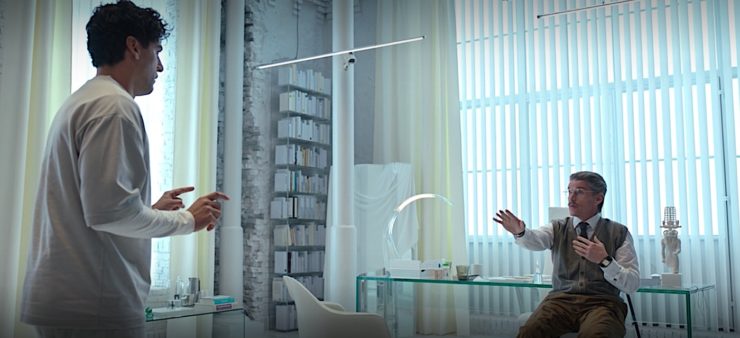
Steven unleashes his inner sassy bitch and mocks Dr. Harrow, describing his look as “very Ned Flanders,” but then Harrow also says his mum is dead, and that Steven’s the one who checked into the hospital after her death. Then he backtracks, says he must be mistaken, and calls her to put Steven on the phone with her as a way to force him to accept the truth.
Which seems… like not a great treatment plan.
But it cracks Steven enough that he flashes back to the memory of the shiva from two months ago. Steven watches the memory of Marc trying to attend his mother’s shiva. He stands across the street, and finally tuns and collapses. He rips his kippah from his head and pummels it into the ground, then hugs it to his chest sobbing. Marc and Steven watch together as Marc transforms into Steven, thinks he’s had another sleepwalking episode, and “calls his mother” so she can talk him through direction. We can see on the phone that it’s not connected to anyone, but looks like he has a map app on his screen instead.
Two months ago, with the news of their mother’s death, the carefully constructed walls started to crack. Steven tells Marc that none of it was his fault, and Marc seems to finally believe him. Then they’re back on Tawaret’s boat, but they’re out of time. The souls of those Marc killed are crawling up to take them down into the sands with them.
Steven watches Marc fight at first, but realizes that if Marc can do it, then so can he, and begins fighting the souls himself using cricket moves. This works beautifully for a few moments, Marc is freed, and then… Steven gets dragged off the boat and lands in the sand.
As Marc screams “Stop the boat!” Steven tries to run after, but gradually the sands work up his legs and he petrifies, reaching after Marc.
Marc begs Tawaret to go back, but it’s too late. A beautiful sun is rising over the Field of Reeds.

May you be well when you hear this
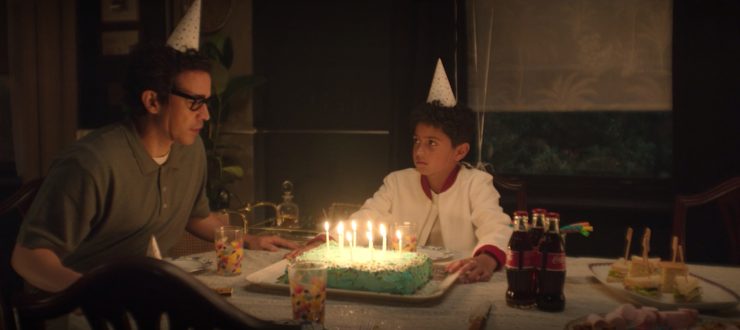
Um.
So, hey, is everyone okay?
For the record, I’m not okay.
I’m honestly not sure where to start here.
First by saying that this episode is incredible. It fully commits to the emotional journeys of Marc and Steven, it treats the Egyptian afterlife with respect, it deals with the death and abuse I mentioned pretty delicately. We don’t see Ro-Ro die, and while we see Marc’s mother lash out at him verbally, the show doesn’t linger on her hitting him. We’re shown how hellish his childhood was, but it never devolves into trauma porn. She wouldn’t come downstairs for his birthday? His father wouldn’t protect him? And then he created an entire reality to try to hide from his pain, and create a safe space for himself, and the thing that brought it crashing down was the death of his abuser. Whom he genuinely loved, of course, because that’s often how that goes.
The idea that goofy ridiculous darling perfect Steven was a creation so he could keep loving his mother. The idea that this is who Marc wanted to be, a nerd who loved Egypt and took care of his fish and called his mum every day and didn’t eat animals. The idea that Marc has been protecting this part of himself, giving him a happy, simple life, even to the point of replacing the fish so Steven wouldn’t know it died.
I think what I’m trying to get at here is that I didn’t expect this show to go this way, or to do it so well. I’m writing from a place of astonishment, so this may be a bit bumpy.
I was pleased that we finally got a more obvious acknowledgement of Marc’s Judaism! I know that’s a larger element in the comics. I thought the way the writers drop us into the family sitting shiva with no explanation was a beautiful way to do it, too—no need for exposition, or showing the family at a synagogue, it simply shows this part of their life and culture. Much like how we’re seeing a vibrant, diverse, modern Egypt in the show, the writers aren’t bothering to slow down and explain things for the WASPs.
On that note, I also found the scene in the street extremely touching. Marc wears the kips with the full intent of going in and mourning his mother, but when he can’t he beats his kippah into the ground. He can take his anger and grief out on this symbol. But he also smooths it out and hugs it—clearly this means something to him. And again, the show doesn’t bog us down with whether he cares about it as a symbol, a mark of his culture and heritage, or if he practices Judaism more formally. In this moment and context, that doesn’t matter as much.
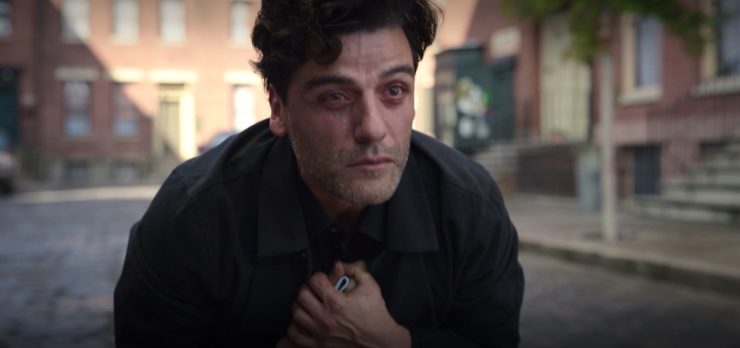
Although the fact that he completely accepts the ancient Egyptian afterlife process is kind of neat.
During Bryan Fuller and Michael Green’s glorious first season of American Gods, we saw the traditional judging process. When an Egyptian woman who still worshiped the old gods died in an accident in her home, she found herself in a vast desert, facing the scales. In the context of that show, peoples’ beliefs determined what they would face after death. It’s seems that Marvel is taking a similar approach here, what with the “this is one of many intersectional planes for untethered consciousness” line. But I really like that the writers just expect us to roll with “Marc’s Judaism is important to him” and “Marc and Steven face an Ancient Egyptian afterlife once they’ve been shot.” I think it’s a good way to honor the comics character’s origins and give lots of focus to Steven’s love of Egypt, and Marc’s deal with Khonshu.
SPEAKING OF.
How fantastic is it that Steven finally gets to see Moon Knight’s origin story, and immediately calls bullshit? In the midst of a very stuffed episode, that moment of Steven standing up for his other self, telling him he’s been manipulated by Khonshu, and that none of this is his fault was incredibly moving to me.
But I feel like—okay. Part of me likes the backstory they’re giving us. The idea that Marc is an abuse survivor, that he blames himself for his little brother’s death, that this has been the thing fueling his own death wish the whole time, and that this trauma was what caused the break that created Steven, I think it’s all pretty solid. But this was an incredible amount of heavy emotional stuff to layer into an hour-long, penultimate episode, and I kind of wish it had been spaced out a little more. I was really excited to have weird fun with Tawaret, and the tonal shifts of this episode, while very deftly handled, were still a lot to process in the final hour of our superhero TV show. I’d love to hear what everyone else thinks about it—did the shifts ever seem jarring to any of you? Did anyone else need to hit pause a couple times to cope with what they were seeing?
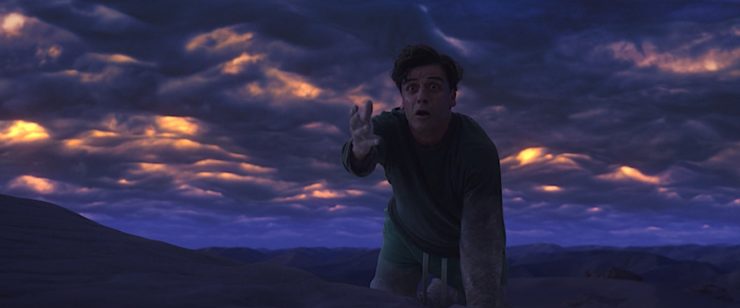
Having said that: Oscar Isaac is so good in this show I don’t even know what to do about it. There isn’t enough capslock in the world. There are not enough reaction gifs. Every interaction between Marc and Steven is perfect—the love, the betrayal, the terror are all perfectly modulated. As I said, the scene in the street, beyond being a lovely moment of character development, was also just bravura acting. And the moment when Steven Bing-Bongs himself while Marc screams his name is so raw. I’m honestly not sure how I feel about it as a representation of DID, the idea that one identity essentially sacrifices itself so the other one can go on to a paradisaical afterlife seems… not great? But as a dramatic scene it was incredible.
Ethan Hawke was excellent as Dr. Harrow, bland and placid and sarcastic and menacing all with the tiniest tweak of a line. The moment he calls Steven’s mom is as chilling as anything he’s done as Ammit’s avatar.
Also Antonia Salib was hilarious as the voice of Tawaret! In the midst of a dark DARK episode, the hippo goddess shone ever brighter.
But I still have a lot of questions! Are we not going to deal with the third identity? Or are they going to be revealed just in time for a cliffhanger ending? Is Ammit wreaking havoc back on Earth? How the heck are they going to wrap all this up next week?
I guess we’ll find out in the finale.
Schrader Scale (of Judgement)
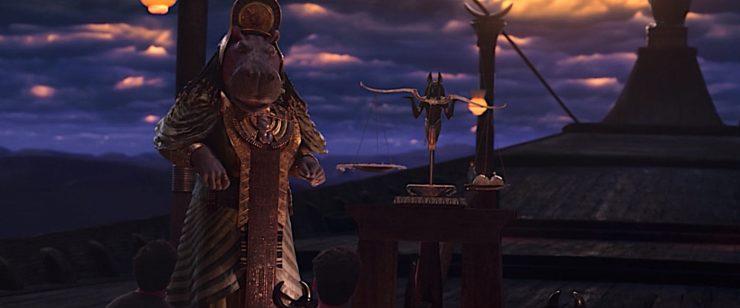
Oh, this one gets a 9. We’ve got horrific familial abuse (Affliction). We’ve got Marc being abused and left for dead by a corrupt military CO (The Card Counter). We’ve got existential despair over a child’s death being forestalled by belief in a deity—in this case, Khonshu (First Reformed). We’ve got the rejection of psychological help in favor of violence (Taxi Driver, kinda). We’ve got suicidal despair transformed into violence against others (um, all of them). We’ve got a conflicted moment with an item of religious significance (um, most of ’em, but let’s say American Gigolo for funsies.). We’ve got making a deal with a potentially malevolent entity in the moments before death (The Last Temptation of Christ [although Jay Cocks helped with that one]). We’ve got resurrection (ibid).
It probably seemed a little far-fetched when I started this scale, didn’t it?
WHO’S LAUGHING NOW.
I can not read the hieroglyphs!
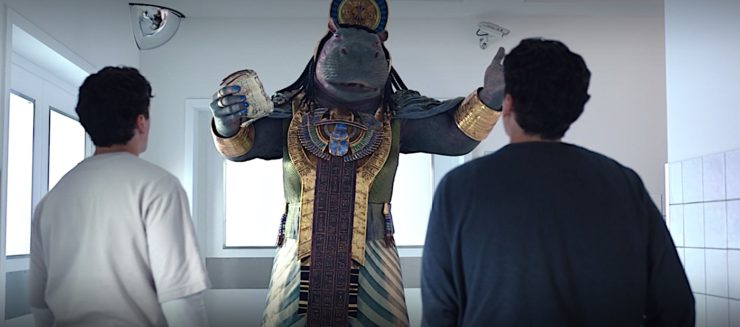
Dr. Harrow, sensing a breakthrough: “This hippo could break down the walls between you and Steven.”
***
Tawaret: “It’s been a minute since we’ve had a soul passing here.”
***
Tawaret: “This is one of many intersectional planes for untethered consciousness… a psych ward’s a first for me but we can roll with it, right?”
***
Marc: “I’m not crazy! I’m dead!”
***
Tawaret (on their hearts refusing to balance): “I do not have a card for this.”
***
Marc (on his cafeteria full of corpses): “I kept wishing I’d fail and one of them would kill me instead. The healing was a curse.”
***
Khonshu: “Do you want life, or do you want death?”
Marc: “I don’t know.”
***
Dr. Harrow (on the downsides of modern psychiatry): “We can’t involuntarily sedate patients! Not these days…”
***
Steven (to Marc): “You made me up?”
Leah Schnelbach might not be getting over this one. Come sail with them through the underworld that is Twitter!










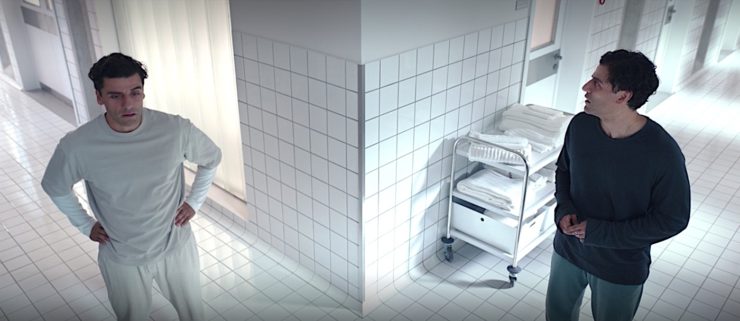
This episode is just a doozy. I am curious on when the third personalty started to come in, and what it’s purpose is. Also, I like the little hint that Tawaret is not actually used to this part of the job. I think Anubis’ shabti was seen near khonshu in the last episode, so i think she took over being the one who presides over the scales of judgement instead of him; because someone has to do the job.
Personally, 2 things immediately spoke to me about how this episode and the show in general has been structured.
The first is that for me, part of the reason this episode works so well is because we got 2 episodes treating Steven as a real person, and 2 episodes treat Marc as a real peron. The question of which is the original is implied, but not asked aloud. Instead the show treats them as 2 people, not one person with a condition.
This mean that we buy it when Marc & Steven are in 2 separate bodies interacting. We accept Steven as an unbiased observer of Marc’s trauma, and his sacrifice here is not structured as the part giving itself for the whole, but of a friend being a hero in the moment.
The second is that I would have about enough at the same time that Marc or Steven would, so I found the Tawaret & Harrow breaks to be well timed.
@1 Given that we see Marc create Steven, he obviously knew he was the original all along, and we are essentially caught up to Steven’s start of the show, the third personality must have emerged for the first time during the rooftop fight at the start of Episode 3.
What’s happening then? Steven is begging Marc not to hurt anyone anymore while they’re fighting a kid.
The natural inference would be that when the walls between them broke down and Steven started acting as Marc’s conscience, they accidentally created a new personality that neither is consciously aware of to handle guilt-free violence.
I’m iffy on how a Jewish person(s) ends up in the “intersectional plane” of the ancient Egyptian afterlife. I guess it’s because they’re bonded to Khonshu? Then again, as I understand it (apologies if it’s inaccurate), Judaism doesn’t really dwell on the afterlife, focusing more on how you live this life.
I’m also iffy on why the Egyptian afterlife would present itself as a psych ward designed to convince Marc that his whole life was a hallucination. Although maybe it’s a manifestation of Marc’s fears about his sanity? He was the one who was ready to believe what “Dr. Harrow” was selling.
I’d be surprised if Steven were gone for good, since they’ve invested so much in making him the main viewpoint character and the one we’re rooting for. But I wonder if the endgame is to reintegrate the personalities, which is the goal of treating DID. If the series is meant to continue, presumably so would Moon Knight’s split personality.
I was tempted to freeze-frame on the Tomb Buster poster and read the credits. Anyone have a screencap? (I’m sure it’ll show up on the MCU Wiki eventually.)
@@.-@ I may be wrong about this, but isn’t a Shiva something that is more meant for the grievers and loved ones, than it is for the one who passed away?
Also, I am still wondering what Dr.Harrow is about, because they seem to be implying that the psych ward may actually be real. is the adventure all happening in his head, and what he said, a coping mechacism? or is that also just Marc’s own mental defenses trying to prevent a reconcilation with Steven? Cause when Steven interacts with harrow, Steven doesn’t seem to think its real either.
@@.-@,5 My takeaway is that the psych ward / Harrow is Marc trying to process everything happening when he died.
Harrow & Tawaret both explain it – the psych ward decor is an organizing principle, as is the ship of Ra. Steven’s mind fills in what to him the Egyptian afterlife is supposed to look like, according to everything he’s read, and everything else is Marc knowing from childhood that he’s had a mental condition, acting as a sort of denial mechanism “I’m not dead, I’m insane” no, he’s both insane, and also dead.
By the way, am I the only one who kept having to remind myself that the one in the white shirt was Marc, not Steven? Because Steven is the “light” character and Marc the “dark” character, so putting Marc in the white shirt seemed like getting it backward.
Also, is this the only installment of the MCU to have taken place entirely while its lead character was essentially dead? And is it the only one to take place entirely on a mental/metaphysical plane instead of (some version of) physical reality?
@7 If we include Lokis At The End of Time and the TVA or Strange’s mirror dimension as a mental/metaphysical plane, then no.
Otherwise yes! Marc/Steven has now spent more screen time in the Duat than the Black Panthers do on the Ancestral plane and Doctor Strange has o the Astral plane.
Only caught a glimpse of the TOMB BUSTERS movie poster, but was amused to see that it stars (or was directed by?) “Don Perlin,” one of Moon Knight’s creators.
@8/chieroscuro: “If we include Lokis At The End of Time and the TVA or Strange’s mirror dimension as a mental/metaphysical plane, then no.”
I don’t count those. The TVA, the Void, and the Citadel at the End of Time are physical realms, as much as Asgard is, say. They’re based in rather wonky physics, but they’re material environments occupied by living, corporeal beings. As for the Mirror Dimension, it’s also a physical dimension of some sort, apparently, but more to the point, it’s never been the exclusive setting of an entire story from beginning to end.
Come to think of it, you could argue that most of the Framework arc on Agents of SHIELD took place in a mental realm, i.e. a virtual reality simulation, rather than the physical world. I think the first three episodes took place entirely within the Framework, without any cutaways to the real world. But the characters were alive, at least.
@9/Greg: It occurs to me that if there is a Tomb Buster movie in this universe, it stands to reason that there must also be a movie called Ghost Raiders.
I did find the varying tones of this one a bit jarring, but I cannot criticize the performances, which all seemed pretty good. Isaac should definitely get some sort of recognition for his performance (but probably won’t, since this is a comic book show).
Starring Johnny Blaze?
@10 That was my thought too, especially considering Spider-man’s interactions inside the mirror dimension, but wanted to make sure I covered the spread.
I had forgotten the Framework arc! Fueled as it is by the Darkhold, definitely counts.
Likewise, there’s the Loa Dimension in Cloak & Dagger. I don’t think an entire episode is set inside, though, as I’m pretty sure there’s cutaways to the material world, and neither Tandy nor Tyrone are dead at the time. But now that I think of it, they spend a fair amount of time there, so they might edge out Marc’s total screen time number.
@13/chieroscuro: My curiosity is not about whether a realm is metaphysical or not, but specifically about whether there have been previous MCU productions that had no scenes whatsoever in (any) physical, corporeal reality.
And I haven’t seen the third Spidey movie yet, so no spoilers, please. Since it’s not on Disney+, I’m on the library’s waiting list for the DVD.
@14 Had to double check – this is the first!
Cloak & Dagger Season 2 Episode 6 takes place almost entirely within a mental projection. But there are 2 portions of 30 seconds apiece in the 41minute episode that happen in the real world. Close but no cigar
@15/chieroscuro: I thought we’d agreed the first three Framework episodes counted. So this would be the fourth.
Hands down the best MCU TV episode yet, if Oscar Isaac fails to get at least an Emmy nomination for his work in this series then it will be very disappointing.
This episode was exciting, funny, intriguing and moving, I cannot express too much how I have enjoyed this series, so far it’s the best MCU TV series, moves above Wandavision into first place for me.. after a few hit and miss series I was beginning to wonder if these Disney + shows had peaked with their very first offering but once again they have raised the bar.
Superb stuff.
I thought the episode was great. My wife, on the other had, did not like it a bit. She is very literal, and this episode was surreal to say the least.
I think in the next episode, which has to return to the real world somehow, will show Marc displaing some of Steven’s knowledge and mannerisms–Steven is not gone, he has been reintegrated.
They left a lot of heavy lifting for that last episode!
@16 – Yeah, blipped that outta my head Final count is 5th.
Agents of Shield Season 4 spends all of Episodes 16 through 19 inside the Framework, with no cuts to the outsid world.
I really expected Jake (the third alter in the comics, usually a taxi driver) to get out of that taxi in the background of the street scene.
As an acting exercise for Oscar Isaac, this show is superb.
As a Moon Knight story, it leaves a lot to be desired. There doesn’t seem to be any interest in telling a story about a superhero here, which is an issue given that it’s supposed to be about a superhero. Instead, it’s a meditation on DID with weird mystical shit.
Loved Tawaret, though. She should get her own spinoff, a la Agatha and Echo, and it’d be guaranteed to be more interesting than this….
—Keith R.A. DeCandido
I think we maybe did see Jake in this episode, during one of the scenes with Harrow, specifically when he’s sedated.
Rewatch that part, he holds his jaw off center, his accent is more pronounced NY, and he threatened real permanent violence not just evasive fisticuffs.
I got serious WandaVision vibes here, complete with Harrow seeming to be very invested in Marc/Steven going through this ‘healing’ journey, but to what end? (And that is high praise, btw as I still find WandaVision to be almost perfect).
It hit me after the episode that this episode is significantly Oscar Isaac acting opposite himself, and I completely forgot that as I was watching the episode.
Since, presumably, Ammit was raised, what happened to Layla, I wonder?
(And yes, that episode was a lot, but it’s been covered best by the reviewer already… so I really have nothing significant to add. But, I also love that they called out the fact that Khonshu is kind of a dick, which I mentioned in one of the previous episodes. Harrow probably does have at least some real trauma/woundedness from all that).
I’m also still wondering if there will be more of a reveal regarding what happened to the dig site. Who was the partner?
This episode didn’t feel at all like a part of the MCU… and I loved it.
Showing the afterlife, dealing with very heavy handed themes, like child abuse, trauma and mental illness, and so on. Very good.
I was feeling kind of meh about Moon Knight before this. But I loved this episode.
@@@@@ 7 It’s not MCU, but Legion also spends much time in a made up reality (astral plane or a reality created by the villain telepathically). I don’t know if an entire episode happens inside it, but at least 90% of some happen. I also don’t know if it counts. It ends in a way that kind of makes it part of a multiverse, involving time travel and stuff, and the MCU is kind of flirting with this in the last movies, so who knows?
It occurred to me that maybe the scales didn’t balance because there were 2 hearts on the scale, when normally there would be one. When Steven gets petrified, his heart goes with him, and once there’s only one heart on the scale it instantly balances.
I do hope we get to see Jake Lockley at some point.
I knew someone who developed multiple personalities to cope with/deal with childhood abuse. I don’t know how many of their personalities I actually met, but I cared for them anyway.
@19/chieroscuro: According to the MCU Wiki, AoS episode 4×19 does have cutaways to Aida and Ivanov in the real world. So it’s only three AoS episodes and this one.
@21/krad: How much of WandaVision was about superheroics? It’s not unheard of for the MCU to broaden the way it approaches stories about superpowered people.
The author said it was “stuffed” and if you’re from Australia you’d understand that as meaning it was bad/not good.
But is it indicating that there was too much in the ep?
@5 you are correct. In Judaism the focus is on the living.
Also finally he is referred to as Dr. Harrow (although the original comic book character was an Internist—as he should be) and he was referred to as DOCTOR Arthur Harrow.
hashtag-therealarthurharrow
Also a brief moment to comment on the difference between “not being allowed to go to a shiva service for his mother” and “not being allowed to ‘sit shiva’ for his mother.” The first is not unreasonable as especially for a young kid to attend the service (crowded with people and sadly in some settings a party atmosphere) but not allowing him to mourn (the shiva is a 7 day period of mourning) would be egregious.
@21 – So you don’t like the show because it’s not focusing on the superhero aspect?
Is this a one-off show or are there more seasons? Haven’t heard.
The show has its up and downs, but gotta give Oscar Isaac props. He’s acting by himself and with himself and knocking it out the park.
@33/davidjcochrane: As reported on this site last week, Isaac is actually playing the scenes opposite his brother, which might be why he has such good chemistry with “himself.” https://www.tor.com/2022/04/22/moon-knight-mork-sphincter-oscar-isaac-brother/
Incidentally, I only just now found out that Isaac’s full name is Óscar Isaac Hernández Estrada, and that has me wondering how “Isaac” is pronounced in Spanish.
Christopher and Austin: My issue is that this is supposed to be introducing us to Moon Knight and doing so by avoiding Moon Knight as much as possible. Yes, WandaVision avoided superheroics for the most part, but that was also focusing on two already-established superheroes and was expanding on what we already knew about them. This is all we’ve got with MK, and it’s not actually about him.
A lot of superhero adaptations have chosen to focus on a part of the character’s backstory that was just a means to an end in the comics, and sometimes it works (focusing on the Punisher’s military background, e.g.) and sometimes it doesn’t (focusing on Danny Rand’s co-owning a large corporation, e.g.). Focusing entirely on the character’s DID is something that can work, but I don’t think it is here, mainly because in a show called Moon Knight, Moon Knight has barely appeared.
This is the sort of story that would, to my mind, work better as the second or third season of a show called Moon Knight, not the first. YMMV, obviously.
—Keith R.A. DeCandido
@35 krad – I get being disappointed with the lack of Moon Knight—and I can’t pretend I’m not a little disappointed, too—but I wouldn’t go so far as to say that a show about a CGI hippo would be more interesting than this show. Moon Knight or no Moon Knight, this show is at the very least interesting, even if some comic book fans would have preferred more Moon Knight.
@35 Keith,
It may help to consider that Moon Knight is not the hero of this tale.
hashtag-therealarthurharrow
@32 A one-off. Oscar Isaac’s contract is for just the six episodes. Notably it doesn’t include the “standard” MCU cameo boilerplate promising later walk-on appearances
The show is called Moon Knight, though. I mean, it’s not unreasonable to expect more Moon Knight, I don’t think…………….
And I wouldn’t have said a show about a CGI hippo was more interesting, too, but then I watched “The Asylum,” and now my whole world is about the Tawaret show starring Antonia Salib.
—Keith R.A. DeCandido
@35/krad: “This is all we’ve got with MK, and it’s not actually about him.”
But he’s not the costume, he’s the person, or in this case the personalities. So it is about him, about who he is and why he’s Moon Knight, not just what he does in the suit.
And what is it that really defines a hero? Is it the costume they wear and the fights they get into, or is it the choices they make and the courage and decency they display? I think this has very much been a story about Steven Grant rising to the occasion and becoming a hero, and giving Marc Spector the chance to become a better man through his example.
I wonder how many people complained that Wandavision didn’t have enough Scarlet Witch in it…
@41 But at least Wandavision had the Halloween episode where she and Vision wore their original comic book costumes…
@@.-@, “Then again, as I understand it (apologies if it’s inaccurate), Judaism doesn’t really dwell on the afterlife, focusing more on how you live this life.” No, you got it right. I’m Jewish, and the vast majority of other Jews I know are not really familiar with Jewish afterlife concepts. Long story short, the souls of the dead go to Sheol, which is more like the 7th Day Adventist concept of “soul sleep” than anything else. Then, when the Messiah comes, everyone is restored to eternal life on Earth, which will have been transformed into a paradise. Or maybe it’s only those who have been written into the “Book of Life.” Even I’m not sure, and I’m the only one in my family who graduated from Central Hebrew High School; it’s a shanda. Anyway, we have no concept of Hell, and the souls of the dead are never in Heaven, only Earth or Sheol.
@22. laura118b Yes! That was for sure Jake popping out!
@7. ChristopherLBennett — Vison is dead for most of WandaVision. Or at best an aspect of whatever made him him is manifested by Wanda from her memories and perhaps their shared experiences with the Mind Stone into a seemingly physical form that’s not his original body. Although I guess you could argue that Wanda is WandaVision’s sole lead character.
@45/Arben: I should’ve phrased it more clearly: My question was about whether the point-of-view character was dead at the time, or otherwise spending the entirety of the episode in something other than physical reality (on this or any other physical plane). In other words, whether there was precedent for an entire episode taking place only in a character’s mind, with zero scenes in the real world.
Gotcha. I saw the replies to the “mental/metaphysical plane” aspect but thought they were discrete questions.
I can’t disagree with KRAD’s complaint @35, “My issue is that this is supposed to be introducing us to Moon Knight and doing so by avoiding Moon Knight as much as possible.”
Yes, Oscar Issac and the rest of the main cast are doing very good work, the Egyptian mythology is cool, and I’m not going to knock the show’s vision after the delightfully wild swings it’s taken. Since this week’s episode is essentially the character’s origin story, I can abide only seeing Moon Knight as Moon Knight in that brief scene where he becomes Moon Knight.
Every time Moon Knight’s suit is summoned I rewind and often pause to check it out again, because I’m totally here to watch superhero comics realized in live-action film. I appreciate the character work being done on this show and find that to be a compelling if not essential part of long-form storytelling in the genre — but costumes and powers are what’s promised on the proverbial tin, and I’d like more.
@34/ChristopherLBennett Incidentally, I only just now found out that Isaac’s full name is Óscar Isaac Hernández Estrada, and that has me wondering how “Isaac” is pronounced in Spanish.
I believe it is pronounced “EESAH-AHK” . Sort of like Esau-awk.